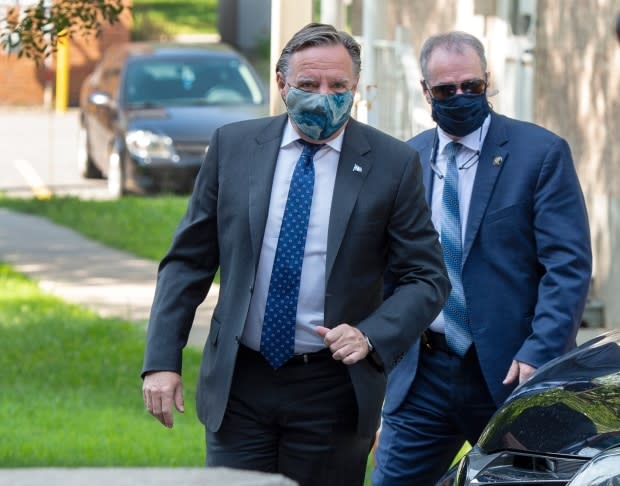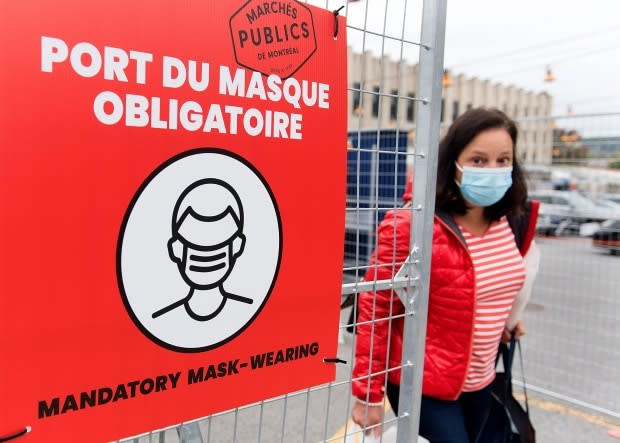Quebec extremists radicalized by COVID-19 conspiracy theories could turn to violence, experts warn

Late one Tuesday night in May, while most of Quebec was still under lockdown orders, the phone rang in Premier François Legault's riding office.
In a calm but firm voice, a man left a message saying he regretted voting for Legault, and then warned the premier that his days were numbered.
A few hours later, at 3:16 a.m., the man called back and left another message. This time he was screaming and swearing about Quebec's top public health official, Dr. Horacio Arruda.
The man said he could get access to a gun and wanted to shoot Arruda.
A member of Legault's office staff who heard the message alerted Quebec provincial police. Their investigation quickly turned international.
The calls were traced to a 47-year-old trucker from Quebec City, Philippe Côté. A tracking device on his truck indicated Côté was in Texas, not far from a gun shop, when he phoned Legault's office.

Canadian border guards were placed on alert. When Côté crossed back into Canada on May 16, they spent three hours searching his truck.
The border guards didn't find any weapons, but they did uncover evidence of a different threat, one that also crosses borders and has the potential for violence.
"Several bits of paper were found on which were written different political conspiracy theories," reads a description of the incident contained in court documents.
Côté was allowed to re-enter the country but was arrested by provincial police a short time later. On May 21, he pleaded guilty to two counts of uttering death threats and will be sentenced later this month.
Côté's lawyer, Olivier Morin, told reporters back in May that his client had been emotionally distraught by the pandemic and the rules he had to follow as a trucker.
"He was mixed up. He wanted answers and he went on conspiracy websites," Morin said.
Since May, provincial police in Quebec have arrested at least four other people for allegedly making online threats against politicians and other public figures. Police have interviewed several more about their online activities following complaints from the public.
The suspects all have Facebook accounts that promote conspiracy theories about COVID-19, including some that originate from QAnon, a conspiracy movement that began in the U.S. and is now considered a national security threat by the FBI.
The Sûreté du Québec says it has received 300 reports since March about Quebec politicians being threatened on social media — an increase of more than 450 per cent over the same period last year.

Experts who monitor extremist groups in Quebec are concerned about the role conspiracy theories are playing in radicalizing online behaviour, and the possibility it could turn into real-world violence.
"We've seen it before, and it was called Alexandre Bissonnette," said Martin Geoffroy, who heads an anti-radicalization research centre at Cégep Édouard-Montpetit, a public francophone college in Longueuil.
Geoffroy was referring to the man who killed six people at a Quebec City mosque in 2017.
"QAnon is ravaging the mainstream population right now," Geoffroy said. "This is part of the collateral damage of the pandemic."
Conspiracy theories take root in pandemic
Conspiracy theories shape the way a significant number of Quebecers think about the pandemic.
A poll conducted last month for Montreal's La Presse newspaper suggested 35 per cent of the population believe mainstream media outlets are spreading false information about COVID-19; 18 per cent believe the pandemic is a tool created by governments to control them.
Those findings echo a survey done in June by the province's public health research institute (INSPQ), which found 23 per cent of Quebecers believe that COVID-19 was fabricated in a laboratory — a theory rejected by scientists who have studied the genetic code of the virus and determined it was not manipulated.
Among the most popular purveyors of conspiracy theories in the province is Alexis Cossette-Trudel, the son of two convicted FLQ terrorists, who broadcasts his views on social media under the moniker Radio-Québec.
His YouTube channel has more than 110,000 subscribers. Analytics show that number has nearly quadrupled since the pandemic hit Quebec in March.

Cossette-Trudel openly expresses support for QAnon, which holds, among other claims, that U.S. President Donald Trump is waging a battle against an international cabal of high-profile liberals who are Satan-worshipping pedophiles operating a child sex-trafficking ring.
In one recent video, Cossette-Trudel said Legault was exaggerating the risks of COVID-19 as part of a global plot to ruin the economy and prevent Trump from being re-elected.
This strain of conspiracy thinking is a visible component in the ongoing anti-mask demonstrations in Quebec.
At a protest last Saturday in Montreal, which attracted several thousand people, there were dozens of posters and T-shirts inspired by QAnon symbols and slogans.
Many participants said they thought the pandemic was "over" or "fake" and that the government was lying about the deadliness of the disease.
"At first I thought Radio-Québec was too extreme, but then with time, I realized they are right," said Marie-Josée Bernard, a mother of three who took part in Saturday's demonstration.
WATCH: Large anti-mask demonstration in downtown Montreal
Arrests for alleged threats
Conspiracy theories, though, are not only contributing to anti-mask protests in Quebec, they also appear to be playing a role in violent online behaviour.
On July 28, a 26-year-old man from Saint-Placide, Que., was arrested for allegedly making online threats against a journalist. His Facebook page has links to conspiracy videos about the pandemic, and content from QAnon supporters.
On July 30, a 27-year-old man from Gatineau, Que., was charged with intimidation, obstructing an officer and three counts of uttering threats against Legault, Arruda and Prime Minister Justin Trudeau. His Facebook page features links to far-right content, videos by Radio-Québec and various other conspiracy videos about the pandemic.
On August 4, a man in his 60s from Sainte-Brigitte-de-Laval, Que., was arrested for allegedly making online threats against both Legault and Arruda. The arrest came shortly after a Facebook account that circulates QAnon conspiracies published Arruda's home address.
On Aug. 7, a 45-year old man from Drummondville was charged with intimidation and two counts of uttering threats, reportedly against Arruda. Along with posting conspiracies about the pandemic, his Facebook page also features racist and anti-Semitic content.
Along with the arrests, Quebec provincial police have also met with several other individuals about threats associated with their social media accounts, at least three of which indicated support for Radio-Québec.
Cossette-Trudel did not respond to a request for comment.
'We don't want to wait until it's too late'
In the U.S., conspiracy theories in general, and those associated with QAnon in particular, have contributed to the radicalization of several people who have committed acts of violence.
A recent study published by West Point's Combating Terrorism Center concluded that the "increasing frequency of criminal or violent acts by QAnon supporters seems possible, even likely" in the months to come.

Experts in Quebec have similar fears that online violence could move offline.
"We're speaking with police to help with prevention. We don't want to wait until it's too late," said Roxane Martel-Perron, who heads education efforts for Montreal's Centre for the Prevention of Radicalization Leading to Violence.
The issue, said Martel-Perron, is not that people would question the government's handling of the pandemic. It's that the answers they are receiving — about shadowy plots out to control them — can be used to justify extreme acts.
"What we're worried about is the violent means that might be taken in response to these perceived grievances," she said.
Quebec politicians have signalled their growing concern, as well.
On Tuesday, the first day of the fall legislative session, independent MNA Catherine Fournier introduced a motion calling on the National Assembly to "recognize that the rise of conspiracy theories in Quebec is alarming and requires concerted action from civil society and public authorities."
The motion passed unanimously.


